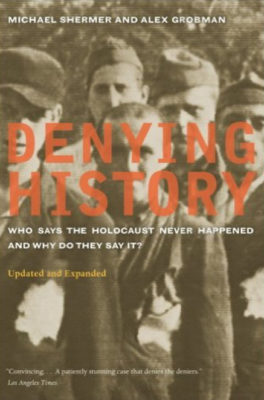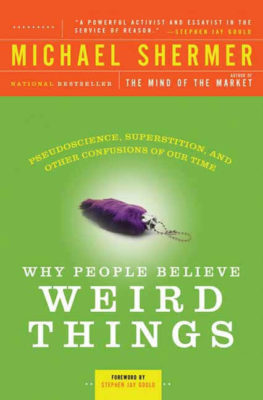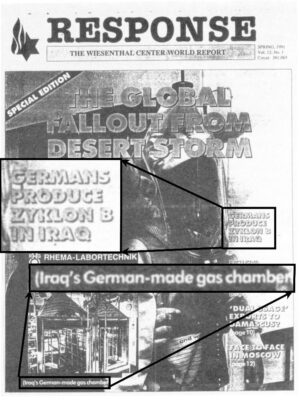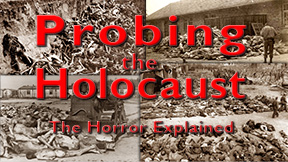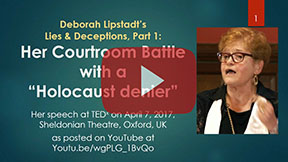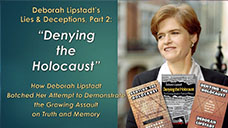When you go to Amazon and pull up Michael Shermer’s and Alex Grobman’s book Denying History, here is what comes up (see the cover of the 2009 edition below):
“Denying History takes a bold and in-depth look at those who say the Holocaust never happened and explores the motivations behind such claims. While most commentators have dismissed the Holocaust deniers as antisemitic neo-Nazi thugs who do not deserve a response, historians Michael Shermer and Alex Grobman have immersed themselves in the minds and culture of these Holocaust ‘revisionists.’ In the process, they show how we can be certain that the Holocaust happened and, for that matter, how we can confirm any historical event. This edition is expanded with a new chapter and epilogue examining current, shockingly mainstream revisionism.”
The primary author of this book, Michael Shermer, has written on the subject since 1994, when he dedicated the major part of an issue of his Skeptic Magazine to discussing, “Who Says the Holocaust Never Happened? And Why Do They Say It?,” the issue’s subtitle, which is also the subtitle of the book that is the topic of the present study.[1]
Discussing revisionist arguments, rather than ignoring them, was still a rather new, if not revolutionary approach back in the 1990s. As a result, Shermer became the scholar to go to when it came to “refuting the deniers.”
He subsequently had a number of exchanges with revisionists, most notably an appearance on national TV on March 14, 1994 during an episode of the Phil Donahue Show, where Shermer debated the two U.S. revisionists David Cole and Bradley Smith. This debate can be watched online at youtu.be/VUjRIcgtz2Y.
A little more than a year later, Michael Shermer accepted the invitation of the revisionist Institute for Historical Review for a panel discussion with the Institute’s director Mark Weber. This discussion took place on July 22, 1995, and can also be watched online at youtu.be/4l8ZUVVB4z8.[2]
Rather than foisting my own opinion upon the reader, I invite you to watch these debates and make up your own mind regarding Shermer’s competence.
There is more to it than meets the spectator’s eye, though, because the Donahue Show had a very interesting background story which David Cole told in his 2014 book Republican Party Animal [3] and the various interviews he has given in more recent years about it, most of which are on YouTube. A summary of this background story was compiled by Jonas E. Alexis in his online paper “David Cole/Stein, Michael Shermer, Holocaust Denial, and Mystery Religions.”[4]
The gist of it is that Shermer was coached by Cole prior to the Donahue Show, because Shermer was a novice in the field and would have looked like a fool during the show, had Cole not helped him out. Cole gave Shermer a list with all the revisionist arguments he planned on bringing up. He then encouraged Shermer to approach the best scholars in the field for the best rebuttals.
The experts Shermer subsequently approached to help him prepare his rebuttal were: Michael Berenbaum (then-director of the U.S. Holocaust Memorial Museum and its research institute), Sybil Milton (senior historian at the United States Holocaust Memorial Museum), Henry Friedlander (a Holocaust survivor who, for a quarter of a century, taught history in the Department of Judaic Studies at the City University of New York), and Alex Grobman (founding editor-in-chief of the Simon Wiesenthal Center Annual). The latter, of course, is Shermer’s co-author for the book under review here.
And here is the result of Shermer’s inquiry with these experts, as told by David Cole:[5]
“I asked him the results of his attempts to get Berenbaum, Milton, Friedlander, and Grobman to address my points. Michael told me, bluntly, that they were unable to address them at all. In fact, he said, these foremost ‘experts’ seemed stymied by the issues I raised regarding Auschwitz and Majdanek.
‘What are you going to say tomorrow?’ I asked him point-blank.
‘I’ll tell the truth.’
‘You’ll tell Donahue that you weren’t able to get answers to any of my questions? From the biggest names in the field?’
‘That would be the only ethical thing to do.’”
But that’s not what Shermer subsequently did, as you can see yourself when watching the show.
In fact, as Cole reports and documents in his book, Shermer admitted to Cole in private that revisionists have the truth on their side in some regards, but when speaking out or writing publicly, he said the exact opposite. Shermer knew that admitting publicly that we revisionists have many valid points would ruin his career. So he went the other way, lying in public about the revisionists and the validity of their arguments rather than doing “the only ethical thing to do.”
In subsequent years, Shermer published two more works on the issue. One, titled Why People Believe Weird Things, came out in 1997.[6] Holocaust Revisionism was only one topic among many addressed in this study.
Why People Believe Weird Things can be regarded as a mere stepping stone between Shermer’s Skeptic article and his “ultimate” study on the topic in Denying History. So I won’t spend much time on it here.
The first edition of Denying History appeared in 2000. I can only speculate why Alex is Shermer’s co-author, since he isn’t exactly an expert in the field of Holocaust studies either. But considering that Grobman is the founding editor of the Simon Wiesenthal Center’s annual periodical, the reason is not hard to guess.
The Simon Wiesenthal Center is firmly invested not only in making sure that no revisions of the orthodox Holocaust narrative will ever be accepted by the mainstream, they are also heavily engaged in spreading false atrocity propaganda in order to push the world into wars against whomever they perceive as an enemy.
Case in point in this regard is the spring 1991 issue of the Simon Wiesenthal Center’s periodical Response, which I reproduce here. The Wiesenthal Center claims that this particular issue was distributed in 381,065 copies mainly all over the U.S. On the cover we read:
“GERMANS PRODUCE ZYKLON B IN IRAQ”
And beneath the illustration of a German-made disinfection device we read the caption:
“(Iraq’s German-made gas chamber)”
When opening the magazine, right on page 2, we read there:
“Shocking Revelation: German Firms Produce Zyklon B in Iraq
True to their legacy of their Nazi-era predecessors, the German business community has sought to absolve itself of its share of blame in the current Middle East disaster. ‘We did not knowingly supply Iraq with weapons of mass destructions – we violated no law – we were just filling orders…’ […]
Even more ominous is the report that Iraq has developed a new potent gas which actually contains Zyklon B. […] this gas, and the nerve gas, Tabun, were tested on Iranian POWs in gas chambers specially designed for the Iraqis by the German company […] (see cover photo of gas chamber prototype). German Gas Chamber: Nightmare Revisited.”
Needless to say, it was all a lie, designed to stir up the world to wage the first Gulf War against Saddam Hussein.
Why would the Simon Wiesenthal Center get involved in this anyway, other than for having a staunch Zionist, war-hawk stance on politics?
And where is the connection to our topic? Well, what can you expect from an author who is also the editor of a periodical published by an institution that readily spreads lies to further extreme political goals like stirring up for war? And why would Shermer, the skeptic, team up with him?
When keeping in mind that Shermer had a rather friendly and understanding attitude toward revisionists in the mid-1990s, the reason for his teaming up with Grobman becomes readily visible. Having intimately socialized with revisionists, Shermer had tarnished his reputation. He who lies with dogs rises with fleas. So he needed an antidote, and in the business at hand, a Jewish chaperon from the fundamentalist Simon Wiesenthal Center is the best antidote one can think of.
This Jewish chaperon was probably the political prerequisite to turn this book into a commercial success. Grobman’s Jewish name and maybe even his intervention when it comes to the book’s contents and terminology probably kept the book “kosher.”
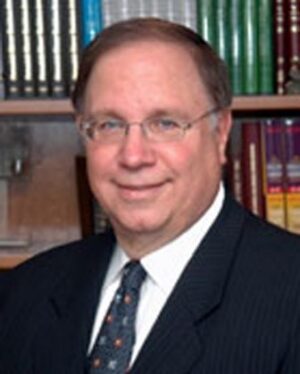
Alex Grobman[7]
In 2009, an new “updated and expanded” edition appeared. It was expanded by adding a chapter on “The New Revisionism” to the end of the book, which deals with “Race, Politics and the Unnecessary Good War.” Because it has nothing to with Holocaust revisionism, we will ignore this new chapter here.
The second expansion happened by replacing the old 4-page epilogue with a new 12-page one that focuses entirely on British historian David Irving’s forced march from being a mainstream scholar to becoming a “Holocaust denier.” While this may be interesting to some, it has little to do with Holocaust revisionism, since David Irving has never published even a single paper on the Holocaust, let alone a monograph. He certainly made many provocative remarks about the Holocaust since the mid-1980s, but he is not at all an expert in the field, and says so at every opportunity. Shermer’s focus on him, which can even be glimpsed from the Index where Irving has one of the longest entries, is therefore utterly misplaced.
Next, let’s see in which way the new, 2009 edition has been “updated”. Let me approach this by asking, in which way should the book have been updated? Most non-fiction books need updating, if, since its last edition, relevant has happened in the field it addresses. In the present case, this means that any major revisionist publication which is superior to earlier works ought to be addressed by Shermer in an updated edition.
But no!
Between the appearance of the first edition of Denying History in 2000 and the second edition in 2009, many new, ground-breaking revisionist studies appeared as journal articles and books, which no serious scholar claiming to refute the “deniers” can ignore. To be easy on Shermer and Grobman, I ignore here the many relevant works published in other languages, foremost those in Italian, German and French, and will focus exclusively on those in the English language. And to be even more merciful with them, I name here no journal articles but only monographs, and among them only the most important ones (which are all part of the prestigious series Holocaust Handbooks):
- Germar Rudolf (ed.), Dissecting the Holocaust: The Growing Critique of ‘Truth’ and ‘Memory’, Theses & Dissertations Press, Chicago 2000 (2nd, revised edition 2003)
- Germar Rudolf, The Rudolf Report: Expert Report on Chemical and Technical Aspects of the “Gas Chambers” of Auschwitz, Theses & Dissertations Press, Chicago 2003
- Jürgen Graf, The Giant with Feet of Clay: Raul Hilberg and his Standard Work on the ‘Holocaust’, Theses & Dissertations Press, Capshaw, Ala., 2001
- Jürgen Graf, Carlo Mattogno, Concentration Camp Stutthof: Its History & Function in National Socialist Jewish Policy; Theses & Dissertations Press, Chicago 2003 (2nd ed., ibid., 2004)
- Jürgen Graf, Carlo Mattogno, Concentration Camp Majdanek: A Historical and Technical Study; Theses & Dissertations Press, Chicago 2003 (2nd ed., ibid., 2004)
- Don Heddesheimer, The First Holocaust: The Surprising Origin of the Six-Million Figure; Theses & Dissertations Press, Chicago 2003
- Carlo Mattogno, Jürgen Graf, Treblinka: Extermination Camp or Transit Camp?, Theses & Dissertations Press, Chicago 2004
- Carlo Mattogno, Belzec in Propaganda, Testimonies, Archeological Research, and History, Theses & Dissertations Press, Chicago 2004
- Carlo Mattogno, Special Treatment in Auschwitz: Origin and Meaning of a Term, Theses & Dissertations Press, Chicago 2004
- Carlo Mattogno, The Bunkers of Auschwitz: Black Propaganda versus History, Theses & Dissertations Press, Chicago 2004
- Carlo Mattogno, The Central Construction Office of the Waffen-SS and Police Auschwitz: Organization, Responsibilities, Activities, Theses & Dissertations Press, Chicago 2005
- Germar Rudolf (ed.): Auschwitz: Plain Facts: A Response to Jean-Claude Pressac, Theses & Dissertations Press, Chicago 2005
- Germar Rudolf, Lectures on the Holocaust: Controversial Issues Cross Examined, Theses & Dissertations Press, Chicago 2005
- Fred A. Leuchter, Robert Faurisson, Germar Rudolf, The Leuchter Reports: Critical Edition, Theses & Dissertations Press, Chicago 2005
- Carlo Mattogno, Auschwitz: Open-Air Incinerations, Theses & Dissertations Press, Chicago 2005
- Germar Rudolf, Carlo Mattogno, Auschwitz Lies: Legends, Lies, and Prejudices on the Holocaust, Theses & Dissertations Press, Chicago 2005
- Carlo Mattogno, Auschwitz: The First Gassing: Rumor and Reality, Theses & Dissertations Press, Chicago 2005
- Carlo Mattogno, Auschwitz: Crematorium I and the Alleged Homicidal Gassings, Theses & Dissertations Press, Chicago 2005
Several more monographs have appeared since 2010 but, of course, they could not have been covered by Shermer in the 2009 edition.
I have rendered in bold the book which contains an earlier version of the present rebuttal of the 2000 edition of Shermer’s Denying History.
One important criterion of scholarship is that one absolutely has to discuss published opposing opinions, in particular if they are directly aimed at one’s work, and if discussing opposing opinions is the declared goal of a study. Both are the case here. Shermer claims to discuss and refute revisionist arguments. So, does the 2009 edition of their book fulfill the minimum requirements of scholarship by updating it to include a discussion of these new revisionist works and the arguments they contain?
Actually, comparing the two editions of 2000 and 2009 results in the astonishing fact that nothing of the old text was updated at all! The only changes to the 2009 edition are the added chapter and rewritten Epilogue, both of which are irrelevant in the present context. The bibliography does not contain any of the books I just listed, and the index has no entries on the most important revisionist authors pointing to pages in the book where any of their works or arguments are discussed.
In other words, the claim that the 2009 edition was “updated” is simply a lie, an implicit denial of the existence of opposing facts, evidence and arguments.
 Hence, Shermer simply plays the infamous three monkeys, pretending that there is nothing to see, nothing to listen to, and nothing to say about the ever-growing body of revisionist research results.
Hence, Shermer simply plays the infamous three monkeys, pretending that there is nothing to see, nothing to listen to, and nothing to say about the ever-growing body of revisionist research results.
Nowadays, any book talking about “Holocaust Denial” has to address first and foremost the arguments laid out in the almost 40 volumes of the growing series Holocaust Handbooks (accessible at www.HolocaustHandbooks.com). Any such “debunking” needs to have its main focus also on the many papers and monographs written by Carlo Mattogno, whose knowledge on the Holocaust may be second to none, and that not only includes the revisionists, but probably also all orthodox Holocaust historians worldwide.
In Shermer’s book, however, you will search in vain for the name Carlo Mattogno (other than in a caption to an irrelevant photo on p. 42) . Maybe he is unfamiliar with Mattogno’s work, and also with the series Holocaust Handbooks. Even though that is possible, it is not an excuse. If an author is unfamiliar with the most important published works of the topic he is addressing, he cannot seriously claim to be a scholar. He is an ignorant fool at best. Or else he knows what he is omitting, and then he is merely a liar, an obfuscator and a fraud.
Denying History is therefore merely another work produced by a set of deliberately autistic fiction writers.
Germar Rudolf, Red Lion, August 11, 2016
[1] Michael Shermer’s paper itself in that issue was titled “Proving the Holocaust: The Refutation of Revisionism & the Restoration of History,” Skeptic Magazine, Vol. 2, No. 4 (June 1994), pp. 32-57 (www.nizkor.org/ftp.cgi?orgs/american/skeptic.magazine/).
[2] A summary of that event was published in the Institute’s periodical M. Weber, “Debating the Undebatable: The Weber-Shermer Clash,” The Journal of Historical Review, Vol. 16, No. 1 (1996), pp. 23-34.
[3] Feral House, Port Townsend, Wash., 2014.
[4] www.veteranstoday.com/2014/06/29/david-colestein-michael-shermer-holocaust-denial-and-mystery-religions/
[5] books.google.com/books?id=jkMxCgAAQBAJ&q=stymied
[6] Freeman & Co., New York
[7] Once at www.fasspr.com/fsb/images/AlexGrobman.jpg; now removed.


